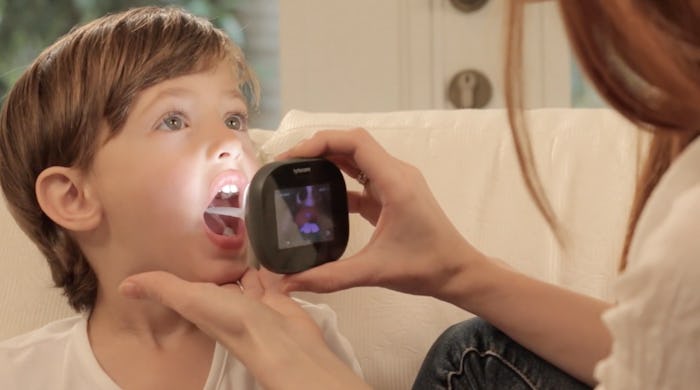News
This At-Home Doctor Kit May Be A Game-Changer For Worried Parents
When you're a parent of a young child, there seem to be a few realities that are completely inescapable. For one, kids are germ magnets, and they'll get sick — a lot. And when they do? Somehow it'll always end up being at the most inappropriate time, leaving you fretting about whether or not it's worth it to head to the emergency room in the middle of the night. But this at-home doctor kit lets you examine your sick kids yourself with a little help from some super cool technology, according to Forbes, and honestly, it sounds like a total game-changer for stressed out moms and dads.
At the CES consumer technology show Tuesday, health technology company Tyto Care brought out its signature device, the TytoHome, which essentially allows parents to make a virtual doctor's appointment from home. With Tyto, parents can connect with a doctor through an app, but instead of simply explaining symptoms, the Tyto device allows the doctor to actually perform an exam, thanks to the plug-in otoscope, stethoscope and tongue depressor adapters that can help diagnose common childhood illnesses like ear infections, colds, and rashes. The outcome? Not only can Tyto help avoid unnecessary visits to the hospital, it can also help allay worried parents' fears without even having to leave the house
Although Tyto obviously isn't a replacement for in-person medical care, it does fill a pretty important need, given that it is *so* hard to know what to do when you have a sick child on your hands, and can't otherwise easily access medical care. In most cases that means either rushing out to the hospital just in case, staying home and hoping for the best, or anxiously Googling symptoms and scrolling through WebMD (which, let's be honest, rarely works out well). So it's really no surprise then that Tyto actually earned the distinction of being Wired's Best Parenting innovation from CES 2019.
But how does it work, exactly? Logging on the the Tyto app will connect you with a board-certified physician, who will perform a live consult. Images taken with the Tyto will be sent to the doctor in real time, and from there, the doctor can send a prescription, if needed, to your local pharmacy, or make a recommendation for follow-up care.
The only downside? You can't just order a Tyto off of Amazon this afternoon and call it a day. Right now, Tyto is currently only available through health care providers and health systems, so the only way to find out if it's an option for you is to go online and fill out a form for more information.
You'll also need a smartphone or tablet compatible for the device (though the website notes that most Apple iOs and Android OS devices will work), but if you can get your hands on a Tyto through your doctor, then billing-wise it should be pretty straightforward: Tyto Care's FAQ indicates that the FDA and HIPPA-compliant device can be paid for with Flexible Spending Accounts, and the exams are often covered by insurance under telehealth services.
As much as it might seem strange to use an app in order to have a medical checkup, telemedicine definitely seems like it can help fill a major need. And in fact, it seems like it's already happening: in rural areas or other underserved locations where accessing in-person medical care isn't always easy, options like remote video conferencing can make a huge difference.
In Wisconsin, where over a quarter of the state's population live in rural areas, according to Wisconsin Public Radio, Prevea Health CEO Dr. Ashok Rai told the outlet that, "[Telemedicine can] provide life-saving advice within minutes where it used to be hours," helping to bridge the care gap that often exists in many areas throughout the country.
Although parents may unfortunately still have some hoops to jump through before virtual housecalls can become a regular part of their lives, it's easy to see why Tyto has already made such a big splash. And while we still may have to rely on Google for a little while longer, it definitely seems like the future of healthcare technology may be very parent-friendly.
